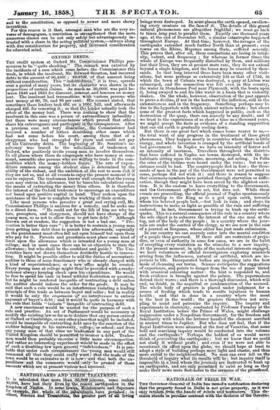' OXFORD DEBTS.!:... Ta.-Ecredit system at Oxford Mr, '0 9w Inies i oiier Phiilips
pro- nounces . to be "quite shocking." . 7:4.. x,cpla..ik. wee. extorte by the incidents of a ease which came hefare4lse ,.Commissioner this week, in which the insolvent', Mr. Edwar&Seratton, had incurred debts to the amount of 98,4501. ; • 491875t.'of that amount -tieing without consideration. . This " indels,". it is true, spreads over a period of many years, but its e. 04kt .was, shown in the proportions of certain claims. As nine as49,000/. was paid be- tween 1848 and 1853 for discount, 7ilaterept, and-bonuses on. money lent.: The insolvent had transactinisjiinthwrvarious persons who lent money at 60;, 70, and 80 per cent:, Illtiebuntel stated, that sometimes these lenders took 00/. on a 10,0ll, and 'afterwards charged 40t. fOi. renewing it; se that 4heAnsler. actually .took the whole of. the money lent. There •was nothing to show that the insolvent in this cage was a person ofextraordinary -imbecility ; but there- Were many oircumStanbea iiiiiirroved that others shire his extravagance and particip#,ik, '20iiiiequences. ' After ,e • a . previous, case, -not very distimiUtiolil.• Co_nuniesioner had-. received a number of letters desnribmgCtliet. oases which had not come - before • his. "court,. i amens them that of a clergyman who had struggled for Olds -and 'could not pay off his University debts. The beginninkef Mr. Seratton's'in- solvency was traced to the solieltiltion of tradesmen at 'Oxford, who positively invite yountmen,to involve themselves. In all places where those do congtegqawho have money at coin- niancl, assemble also persons--Who ara.Wilanglsarade in the com- medifiet which the ineney-hOldera .de4ii0";!The rate of expen- diture common anning the student cl4a4a determined by the ability of the-richest, and,thaambition,ofithe rest to seem rich if they are not to, and at 'all t*ents to etijorthe present moment if it can be enjoyed. The tradeiinian knows vtell'enotigh that the young man may outrun.his allowance,' but lie:bates-his calculations upon the means 'of 'extracting the Money from others. It is therefore the interest of the-DXford tradesmen to encourage an expenditure not based upon positive' capital- in hand.. They reaoñ upon the assistance Of the law to complete the working of their stem. ' Like -most persons Who perceive i great and cryingevil, Mr.' Counnitsiinier Phillips is anxious for a remedy, and he seeks one in a aired forth. ' • ' He could not for the,life of hiiti see why tu- tits, preceptors, ' and clergymen, should 'not have charge of the young Men, so as not to allow them to get into debt." - Although thrown out at random, the suggestion is not a bad one. " Pre- ventionls better than cure" ; it is better to-restrain a young man from getting into debt than'to 'Finish hiiii• afterwards, especially as the punishment must often-fall not upon himself but upon those who pay for it. Parents and gnarditiriamiist place some kind of limit-upon the allowance which is intended for a young man at college, • And in most cases there can 'Mine objection to statethe alloWanee ;• but who shall be-the confidant and -guide? ' The Uni- versities have not shown themselves' decidedly hostile to innova- tion: it might be possible either toatddltherduties of accountant-- auditor to those of somaftinctionary: *boil:II-already charged with a kind . of superintendence, or a miivrotifilee might be 'created. ESery•young man at 'college might thtili) berlProvided with a ready- reckoner always keeping cheek upbsAitietpenditure. He would be free to spend his caeb.. -- int endlaiththitioestiietion or question, -but he Might be rendered incepableArtiliontilieting tt debt unless the auditor should indorse the order:fa/0AM gPods. It may be said that such a rule would be an inieilleitnee violating li. leading principle of free trade as between buyer Wet-eller ; but in reality it would be- only the suspension of itikUtterferenee- to enforce payment of-buyer's debt ; iiiitl.l.t*otildliie tinite in harmony with the rule that holds "infants" ineapallle OPOOntracting debt. ' A new enactment would 14' Wanted-fercIthe" purpose of such a rule and practice. ' An act- Of IttolitenitittowonIct be necessity to modify the existing law so fair as takleehlarthat any person entered at Oxford or Cambridge, or-any erthetilattithatanight be included,- would be incapable eteontractingdebtittlye(13Ttlie sanction Of the auditor belonging' to hi's ittateiklittyjaoltel.et school; and from any young, Irian of that :elitlia'riitit tialt4stliale in any part of the United rinebin shoal& b8-Vextidttkot8igttaver a debt:" Trades- men would then 'probtiblrekeroittelWitiftte 3mCfre .circumspection. And -rather an interetting 6ti-gi:iiiielit9aii%rdzfri# rriade in the effeet of Stith a disabling-law upon geneirlil fflifittibtkiltetie." It is pro- bable that under Such cirennietimig) therailig men *wild still conimind all that' they could riaf piatilt PAM -the trade of the town Would be as extensive as it'-ieholtOrtifitl =that; both the -ek- penditure and the coininerce -iiirottdd'idtelieitia- pruned' of those amounts which are at present Vieibiligut&tonnd. "


























 Previous page
Previous page